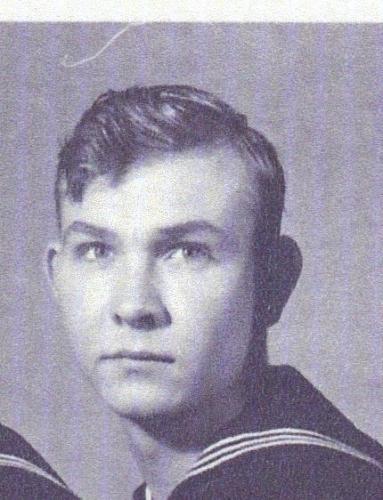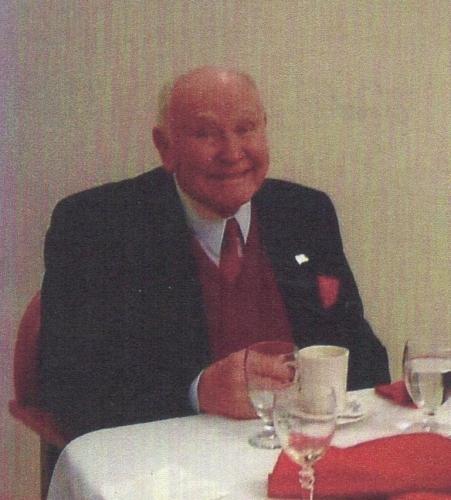Veteran Robert Lee Spicer, Jr.
Robert Lee Spicer, Jr.
Robert, better known as “Bob,” was born July 17, 1925 in the beautiful old city of Richmond, Virginia. He remembers the times of his early childhood when he played sports and games with the neighborhood children, took trips with his family, and hunted and fished with his dad. Bob is a strong advocate of peace, and his happy home and loving family, his experiences in his church, and pleasant experiences with his early playmates might well be the key to his peace loving personality. But on July 6, 1943, a few days before his eighteenth birthday, his love for America and desire to do his part in America’s war effort carried the day. Bob enlisted in the U. S. Navy.
Bob says that his Navy career began by his being put aboard a hot, coal driven train to go for boot-training in Sampson, New York, and there he was shorn of his clothing and hair, ordered to shower, and issued Navy clothing and sleeping gear. For nearly three years he would be living a different kind of life than he ever had experienced as a civilian.

In boot camp the main thing he remembers that differed from his former life was having to get accustomed to the ways of so many different kinds of young men. Some talked in their sleep at night, some liked to play practical jokes, and some had much to learn in the ways of personal cleanliness. Regular activity required by the Navy centered on learning military discipline, physical fitness, recognition of authorities and how to respond to them, and other details regarding naval tradition.
From boot camp he was sent to Camp Allen near Norfolk for further training. There he learned the use of small arms as well as 20 millimeter and 40 millimeter anti-aircraft guns. Bob says the camp was near the beach so he could see and hear the Navy aircraft patrolling the coast looking for enemy submarines. During this early training he was able to obtain frequent liberty to visit his folks and at times he would even take one of his friends with him.
After finishing training at Camp Allen he was sent to Lido Beach, New York. Life in the Navy by that time might have seemed fairly easy since he was able there as well as at Camp Allen to obtain much liberty. But things were about to change. After one month he was put aboard the Queen Mary bound for Glasgow, Scotland where the sun shone only a few hours daily and Bob never felt so cold. Fortunately he was there only a short time and then sent to Penarth, Wales where the sailors took quarters in private homes. There Bob had some social activity with the local girls, and through an accident was able to meet and dine with one of his favorite football players, Tommy Thompson of the Philadelphia Eagles. He learned to really like the people of Great Britain.
After the Normandy invasion, the need for American sailors in the British Isles was finished, and his unit was sent to war torn Bizerte to help prepare for the Allied invasion of southern France. In Bizerte he learned a good deal about the Arab culture, and often went to Tunis for liberty. But as they were not needed for the invasion, they were sent back to New York and were in Lido Beach in November, 1944 getting ready to be sent to the Pacific theatre of war. Bob’s most dangerous time of service was about to begin. They were bound for Iwo Jima (Jima means island in Japanese), where some of the most fierce fighting of World War II was to take place.
Following is part of Bob’s own account of this important battle:
“Mt Suribachi at the southern end of the island was honey combed with openings from the bottom to the top consisting of both small and large gun implacements as well as personal entrances. Between the northern and southern end were installations made of thick concrete and embedded in the hillside overlooking the East Beach. Between the two, Suribachi and the higher part of the northern end, there were connecting machine gun emplacements that could face all directions in well-defined bunkers above ground enough so that the defender could stand his ground and not be much of a target for the aggressor.
When the Marines came ashore, their heavy guns and tanks couldn’t get off the beach because of the volcanic ash; they just sank right into it because it was like quicksand. There was no natural cover since they were in the open and being shot at from Mt. Suribachi in the South, the high ground in the north, and connecting machine gun replacements in the middle; where to go? Well they had to call on the ships for bombardments of these installations. The problem was that the ships that were to bombard the north end had to go to the south end of the island to fire if they were to get a direct hit on any gun placement on that installation and to the north end of the island, if they were to get a direct hit on the southern end of Mt. Suribachi.

The entrance ways of the caves were all at an angle to prevent any direct hit from entering into a cave. Therefore, they would only receive a glancing blow with a small amount of damage. Likewise, the air bombardment was limited. Friendly fire was also a factor, since the Marines had objectives that positioned them in the areas to be taken. I don’t know why they didn’t hit the West Beach -- flat beaches without much volcanic ash were there. The West beaches had mounted on them shore batteries that had been disabled useless by the fleet from the 72 days of bombing and firepower by both naval ships and planes. Why didn’t they invade the West?
I was not in the initial invasion of February l9, l945, we didn’t get to the island until March. We were the second assault echelon to go on Iwo."
Bob was discharged from the Navy on March 18, 1946 under the point system and returned to Randolph- Macon College. He obtained a law degree and worked for the C and O Railroad, then on to the U. S. Patent Office where he spent most of his working years. He married Dorothy Watts on January 29, 1949 and they have three children, Patricia Lee, Robert Lee, III, and Steve Allen.
He sums up his war experience by saying, “War is fought by the young; it is the young that never come back and are the heroes that give us the right to live in a free country.” We appreciate his views on the benefits of peace between nations rather than war, a view that is shared by many veterans who have experienced actual combat.
As told to Dick Young